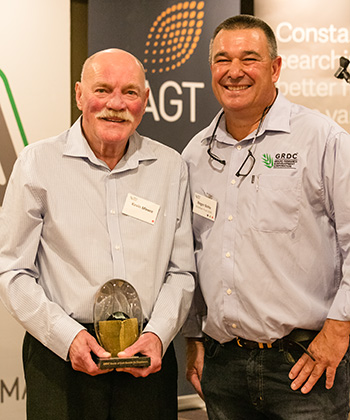Renowned Senior Plant Pathologist, Dr Kevin Moore, has been recognised by GRDC with its highest accolade, receiving the 2023 Seed of Gold award for his impactful work in crop protection at this year’s GRDC Grains Research Update in Goondiwindi.
Dr Moore’s extensive 55-year career in crop protection has had long-lasting effects on the grains industry, with his research outcomes and pulse disease management strategies still being actively used by fellow researchers and growers to improve profitability.
Usually, GRDC Panel awards recognise individuals who have impacted one of Australia’s specific grain growing regions, but the Seed of Gold acknowledges that Dr Moore’s work has had an industry-wide impact, with his work generating better outcomes for growers and businesses right across the country.
GRDC Northern panel chair Arthur Gearon says Dr Moore’s career and what he achieved during his time in the grains industry is famous among growers and researchers.
“There is no argument that Kevin established himself as a leader in the disease management field, heading ground-breaking research across management strategies that allowed growers to produce more reliable crop yields, particularly with chickpeas,” he says.
“Kevin’s expertise supported growers in establishing chickpeas into their rotation back when the crop started generating some buzz with good prices and on-farm benefits.
“He has been instrumental in identifying resistant chickpea lines, developing integrated management strategies to actively address and avoid disease and providing industry support to help growers confidently establish effective crop rotations that incorporate pulses – boosting profitability.”
Dr Moore, who is currently on long service leave with the NSW Department of Primary Industries (NSW DPI), has shown significant dedication to his career, starting with what was then known as the NSW Department of Agriculture back in 1966 as a trainee.
His pathology career officially kicked off in 1969 as a cereal pathologist but he became heavily involved in chickpea breeding and adoption when Australia’s chickpea breeding program was established in Wagga during the 1980s.
The Tamworth-based pathologist said back then, he remembers having to drive as far as Croppa Creek to find a chickpea crop as the crop’s uptake was very minimal.

Recipient of a GRDC Seed of Gold award Dr Kevin Moore (NSW Department of Primary Industries) with GRDC Northern Panel deputy chair Roger Bolte. Photo: Melanie Jenson
Over the course of his career, Dr Moore said he has watched chickpeas become a stable, reliable part of growers’ crop sequencing and rotation, providing both profitability and on-farm benefits.
“It’s been an honour to have played a small role in establishing chickpeas as an option for Australian growers,” he says.
“After a huge price surge in 2016, I think the crop has finally reached a balance where it’s just become part of a normal rotation and will remain so into the future.”
Dr Moore credits the incredible breeding work conducted by his former colleague, Ted Knights, for getting Australia’s chickpea industry in a good state to progress.
From there, Dr Moore says he was personally able to contribute to Australia’s pulse industry, through his work with NSW DPI, helping ensure well-established varieties can grow despite disease and weed threats, making them a plausible option for growers that they can profit from.
Throughout his career, Dr Moore has played a huge role in developing cost-effective disease programs that growers can implement to avoid yield loss from common pulse diseases like ascochyta and phytophthora root rot.
This has involved identifying and selecting resistance traits that have been incorporated into breeding programs, looking at crop rotations and sequencing to see how they can reduce and heighten disease risk, and looking at effective in-crop fungicide management to control infections.
“I’d like to thank and acknowledge my colleague, Dr Kristy Hobson in being part of this – she replaces Ted Knights as chickpea breeder and has shown me continued support and collaboration,” he says.
Dr Moore says he was completely gobsmacked to be recognised by GRDC and the Regional Panels with the prestigious Seed of Gold award.
“I was in the first round of applicants for GRDC funding when it was first established and since then, I have formed a wonderful alliance and partnership with the organisation,” he says.
“I have made a lot of good friends with panel members and GRDC management that I will continue to value.
“That’s the same with the farmers and researchers I have met throughout my career. Some of the growers I work with now, I knew them as kids - and now I’m visiting their farms, meeting their kids.
“This role has been more than a job; it’s made me a part of a community and that has been extremely humbling and rewarding.”
Dr Moore is set to retire from the NSW DPI at the end of his long service leave next year. This will conclude 57 years of service with the department.
Mr Gearon says he was so pleased to see Dr Moore recognised for his dedication and commitment to the grains industry with the Seed of Gold.
“Kevin’s impact on our industry has been profound and he is such a well-respected figure that growers have a lot of trust in,” he says.
“I wish him all the best as he nears the end of his career and thank him for his wonderful service he has shown in helping grain growers become more efficient and effective.”

























































